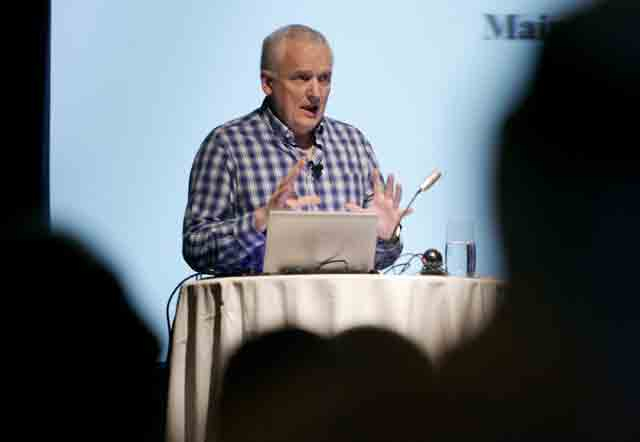Dubai: User-generated media is the new nervous system of the planet and the guns and bullets for the members of this new generation are Facebook, Twitter, YouTube and the Internet, according to veteran BBC World Service presenter Nik Gowing.
Speaking at a Gulf News-sponsored session titled 'Skyful of Lies and Black Swans: Who controls shifting information power during sudden crises?' at the Emirates Airline Festival of Literature (EAFL) in Dubai on Saturday, Gowing said there were fundamental changes happening in the way in which news and information spreads around the globe, specially in times of unexpected situations such as the devastating earthquake in Japan, the violent uprisings in Egypt, Tunisia and Libya, the BP oil spill or even the student protests in the heart of London.
"Information now flows around the world so incredibly fast that corporate organisations, governments and all kinds of institutions are struggling to respond fast enough and effectively enough,” Gowing said. The result was that all these institutions were feeling challenged by the onslaught of information – on television, in print media, in blogs, websites and videos, or even on social media – in an age where everybody is a member of the media community.
Gowing has interpreted the rising power of what he calls the "information doers" and the fragility and vulnerability of the traditional institutions of power in his peer-reviewed analysis 'Skyful of Lies and Black Swans,' produced for the Reuters institute at Oxford University. According to him, the lessons for this new age are simple: the changing paradigm of media has resulted in feelings of vulnerability, fragility and brittleness of power as well as a "deficit of legitimacy," and led to a demand for new accountability from those in positions of power – whether it's Muammar Gaddafi or Tony Hayward, the former boss of BP, or a top official from Scotland Yard who denied students had been charged by police on horseback, only to be shown YouTube evidence of the crime.
"Things are changing, the mountains are moving right at the top," Gowing said at the session moderated by Francis Matthew, Editor-at-Large of Gulf News. Explaining the title of the research, Gowing said the origin of 'Skyful of Lies' was in the phrase that Myanmar’s generals had made about the crackdown on harsh anti-junta protests in 2007. The generals had reportedly accused foreign media of publishing a 'skyful of lies' about the crackdown and pretended it did not happen. The Black Swans part of the title was borrowed from the concept coined by Lebanese thinker Nassim Nicholas Taleb as a metaphor of any event that is a surprise to the observer and has a major impact, though after the event, it is rationalised in hindsight.
The BP oil spill crisis and the intense snowstorms that brought Heathrow International Airport to a standstill last year were prime examples of how those in positions of power could no longer react in a traditional manner to events that significantly impact their brands, according to Gowing. Tony Hayward of BP in the first case and the British Airways Authority (BAA) in the latter one had to pay the price for attempting to subvert crises that were clearly unfolding in the public domain.
In an impromptu appearance at the session, Sunday Times Foreign Correspondent and media veteran Christina Lamb said the emerging trend to break news on the trot across 24 hours – as social media is doing - has put a lot of pressure on existing media outlets to get "something" out first and raises doubts about their credibility.
"There’s tremendous pressure [on media outlets] to report on breaking news quickly,” Lamb said. “For instance, in the case of Gabrielle Giffords, the US politician who was shot by a gunman, I heard on the radio and from two other sources that she had been pronounced dead. I was on deadline and so for the first edition of my newspaper, I filed a story saying she had died. But just minutes later, the hospital announced that she was alive. And her husband later said in reports that for 20 minutes he and Giffords’ mother both thought she had died. This is the kind of pressure that journalists and media organisations face today as they grapple with ways to deliver news ahead of social media.”











